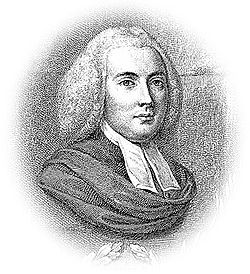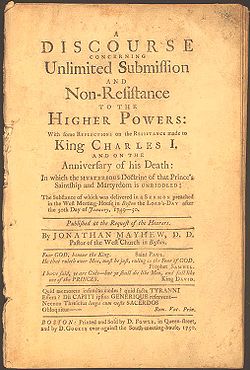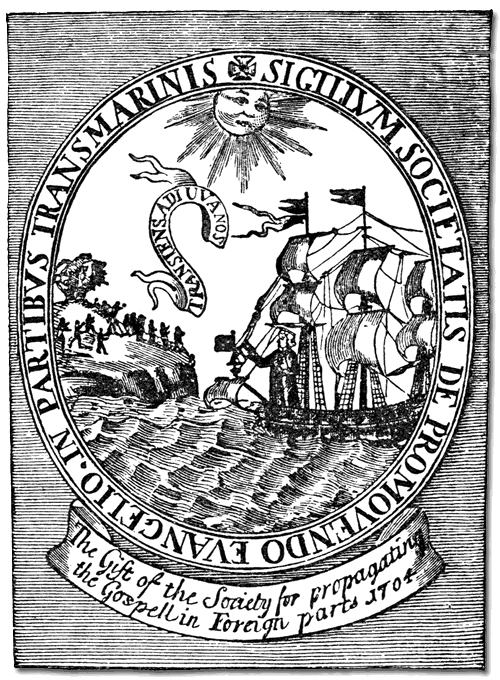
Jonathan Mayhew
Encyclopedia

Old West Church, Boston, Massachusetts
The Old West Church at 131 Cambridge Street, is a historic church located in the West End of Boston, built in 1806 to designs by architect Asher Benjamin...
. He is credited with coining the phrase "no taxation without representation
No taxation without representation
"No taxation without representation" is a slogan originating during the 1750s and 1760s that summarized a primary grievance of the British colonists in the Thirteen Colonies, which was one of the major causes of the American Revolution...
."
Early life
Mayhew was born at Martha's VineyardMartha's Vineyard
Martha's Vineyard is an island located south of Cape Cod in Massachusetts, known for being an affluent summer colony....
, being fifth in descent from Thomas Mayhew (1592-1682), an early settler and the grantee (1641) of Martha's Vineyard. Thomas Mayhew, Jr. (1622-1657), his son John (d. 1689) and John's son, Experience Mayhew
Experience Mayhew
Experience Mayhew was a New England missionary to the Wampanoag Indians on Martha's Vineyard. He was born on January 27, 1673, in Martha's Vineyard, Massachusetts, the oldest son of Rev. John Mayhew, missionary to the Indians, and great-grandson of Gov. Thomas Mayhew...
(1673-1758), were active missionaries
Missionary
A missionary is a member of a religious group sent into an area to do evangelism or ministries of service, such as education, literacy, social justice, health care and economic development. The word "mission" originates from 1598 when the Jesuits sent members abroad, derived from the Latin...
among the Indians of Marthas Vineyard and the vicinity.
Mayhew graduated from Harvard College
Harvard College
Harvard College, in Cambridge, Massachusetts, is one of two schools within Harvard University granting undergraduate degrees...
in 1744 and in 1749 received the degree of D.D. from the University of Aberdeen
University of Aberdeen
The University of Aberdeen, an ancient university founded in 1495, in Aberdeen, Scotland, is a British university. It is the third oldest university in Scotland, and the fifth oldest in the United Kingdom and wider English-speaking world...
. So liberal were his theological views
Liberal religion
Liberal religion is a religious tradition which embraces the theological diversity of a congregation rather than a single creed, authority, or writing...
that when he was to be ordained minister of the West Church in Boston in 1747, only two ministers attended the first council called for the ordination, and it was necessary to summon a second council. Mayhew's preaching made his church practically the first Unitarian
Unitarianism
Unitarianism is a Christian theological movement, named for its understanding of God as one person, in direct contrast to Trinitarianism which defines God as three persons coexisting consubstantially as one in being....
Congregational church in New England
New England
New England is a region in the northeastern corner of the United States consisting of the six states of Maine, New Hampshire, Vermont, Massachusetts, Rhode Island, and Connecticut...
, though it was never officially Unitarian. He preached the strict unity of God, the subordinate nature of Christ
Christ
Christ is the English term for the Greek meaning "the anointed one". It is a translation of the Hebrew , usually transliterated into English as Messiah or Mashiach...
, and salvation
Salvation
Within religion salvation is the phenomenon of being saved from the undesirable condition of bondage or suffering experienced by the psyche or soul that has arisen as a result of unskillful or immoral actions generically referred to as sins. Salvation may also be called "deliverance" or...
by character.
Political views
In politics, Mayhew bitterly opposed the Stamp ActStamp Act 1765
The Stamp Act 1765 was a direct tax imposed by the British Parliament specifically on the colonies of British America. The act required that many printed materials in the colonies be produced on stamped paper produced in London, carrying an embossed revenue stamp...
, and urged the necessity of colonial union (or communion) to secure colonial liberties. He was famous, in part, for his 1750 and 1754 election sermons espousing American rights — the cause of liberty and the right and duty to resist tyranny; other famous sermons included "The Snare Broken," 1766. His sermons and writings were a powerful influence in the development of the movement for liberty and independence.

Charles I of England
Charles I was King of England, King of Scotland, and King of Ireland from 27 March 1625 until his execution in 1649. Charles engaged in a struggle for power with the Parliament of England, attempting to obtain royal revenue whilst Parliament sought to curb his Royal prerogative which Charles...
(January 30, 1649/50). Taking vigorous issue with recent efforts to portray Charles as a martyred monarch, Mayhew began with observations on the antiquity of English liberties. The English constitution
Constitution of the United Kingdom
The constitution of the United Kingdom is the set of laws and principles under which the United Kingdom is governed.Unlike many other nations, the UK has no single core constitutional document. In this sense, it is said not to have a written constitution but an uncodified one...
, he asserted, “is originally and essentially free.” Roman sources, such as the reliable Tacitus
Tacitus
Publius Cornelius Tacitus was a senator and a historian of the Roman Empire. The surviving portions of his two major works—the Annals and the Histories—examine the reigns of the Roman Emperors Tiberius, Claudius, Nero and those who reigned in the Year of the Four Emperors...
, made it clear that “the ancient Britons … were extremely jealous of their liberties.” England’s monarchs originally held their throne “solely by grant of parliament,” so the ancient English kings ruled “by the voluntary consent of the people.” After forty pages of such historical discourse, Mayhew reached his major point: the essential rightness of the execution of an English king
Regicide
The broad definition of regicide is the deliberate killing of a monarch, or the person responsible for the killing of a monarch. In a narrower sense, in the British tradition, it refers to the judicial execution of a king after a trial...
when he too greatly infringed upon British liberties
Civil liberties in the United Kingdom
Civil liberties in the United Kingdom have a long and formative history. This is usually considered to have begun with the English legal charter the Magna Carta of 1215, following its predecessor the English Charter of Liberties, a landmark document in English legal history...
.
The vigor of Mayhew’s sermon established his reputation. It was published not only in Boston, but also in London
London
London is the capital city of :England and the :United Kingdom, the largest metropolitan area in the United Kingdom, and the largest urban zone in the European Union by most measures. Located on the River Thames, London has been a major settlement for two millennia, its history going back to its...
in 1752 and again in 1767. In Boston, John Adams
John Adams
John Adams was an American lawyer, statesman, diplomat and political theorist. A leading champion of independence in 1776, he was the second President of the United States...
remembered long afterward that Mayhew’s sermon, “was read by everybody.” Some would say later that this sermon was the first volley of the American Revolution
American Revolution
The American Revolution was the political upheaval during the last half of the 18th century in which thirteen colonies in North America joined together to break free from the British Empire, combining to become the United States of America...
, setting forth the intellectual and scriptural justification for rebellion against the Crown.

USPG
The USPG or United Society for the Propagation of the Gospel is a 300-year-old Anglican missionary organization, formed originally as the Society for the Propagation of the Gospel in Foreign Parts in 1701...
, a branch of the Church of England
Church of England
The Church of England is the officially established Christian church in England and the Mother Church of the worldwide Anglican Communion. The church considers itself within the tradition of Western Christianity and dates its formal establishment principally to the mission to England by St...
established "to send priests and schoolteachers to America to help provide the Church's ministry to the colonists". His Observations on the Charter and Conduct of the Society for the Propagation of the Gospel in Foreign Parts was published in Boston and London and raised considerable opposition in England and America; Thomas Secker
Thomas Secker
Thomas Secker , Archbishop of Canterbury, was born at Sibthorpe, Nottinghamshire.-Early life and studies:In 1699, Secker went to Richard Brown's free school in Chesterfield, staying with his half-sister and her husband, Elizabeth and Richard Milnes...
, then archbishop of Canterbury
Archbishop of Canterbury
The Archbishop of Canterbury is the senior bishop and principal leader of the Church of England, the symbolic head of the worldwide Anglican Communion, and the diocesan bishop of the Diocese of Canterbury. In his role as head of the Anglican Communion, the archbishop leads the third largest group...
, wrote an Answer the following year.
In 1765, with the provocation of the Stamp Act fresh, Mayhew delivered another rousing sermon on the virtues of liberty and the iniquity of tyranny. The essence of slavery, he announced, consists in subjection to others—“whether many, few, or but one, it matters not.” The day after his sermon, a Boston mob attacked Chief Justice Thomas Hutchinson’s house, and many thought Mayhew was responsible.
Mayhew was Dudleian lecturer
Dudleian lectures
The Dudleian lectures are a series of prestigious lectures on religion at Harvard University, where they are the oldest endowed lectureship. They have been given every year from 1755 to the present....
at Harvard in 1765. He died July 1766.
A quarter century after his death, the following lines were delivered at the Harvard commencement address of 1792:
While Britain claim'd by laws our rights to lead,
And faith was fetter'd by a bigot's creed.
Then mental freedom first her power display'd
and call'd a MAYHEW to religion's aid.
For this great truth, he boldly led the van,
That private judgment was the right of man.

